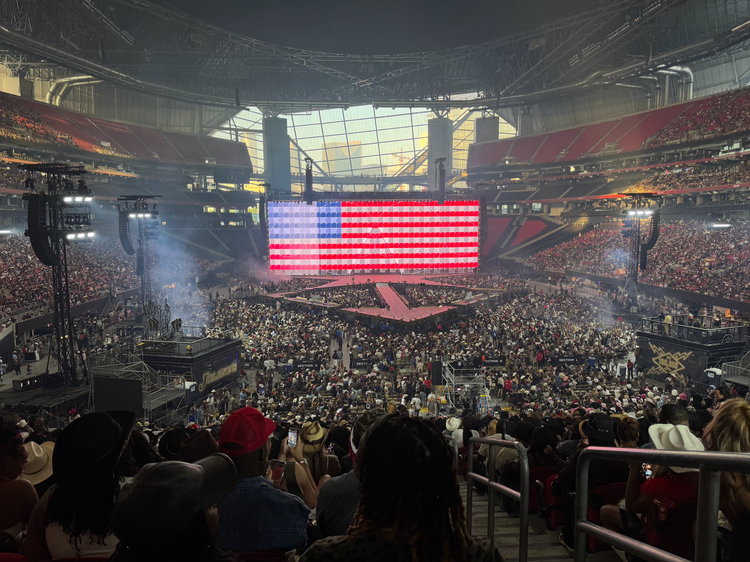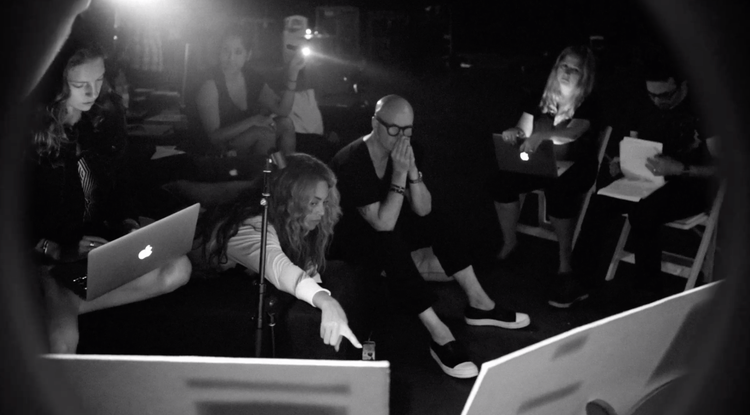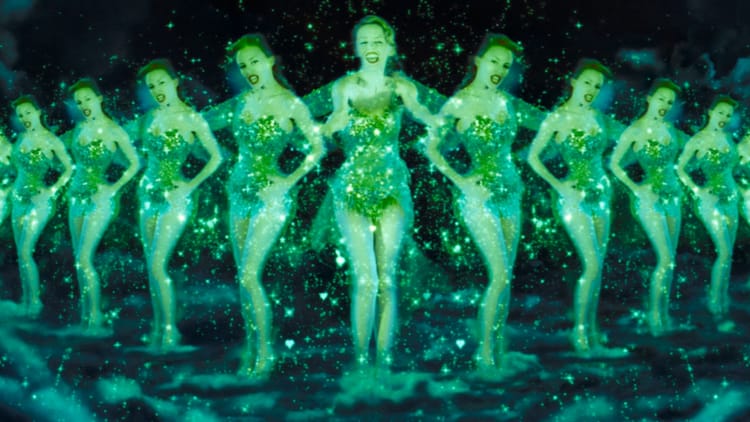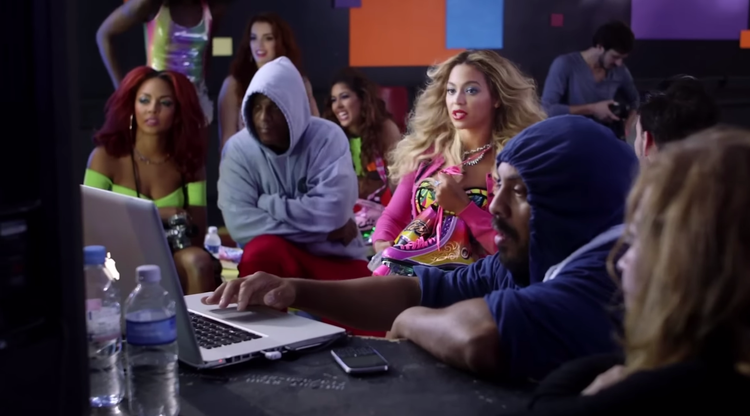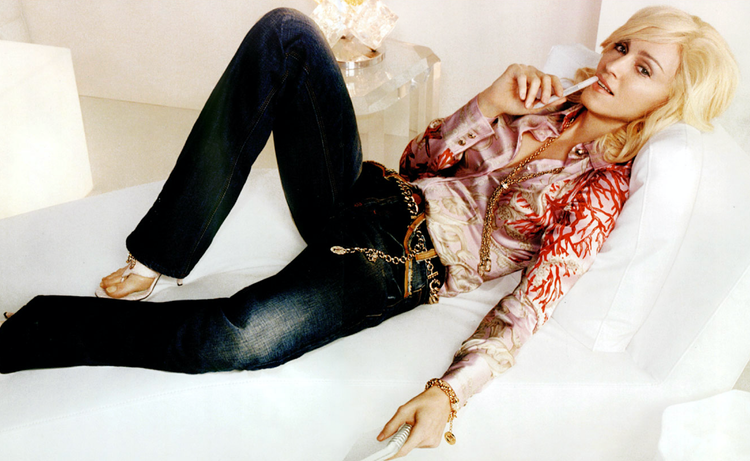Casci Ritchie on Telling the Story of Prince Through His Clothes
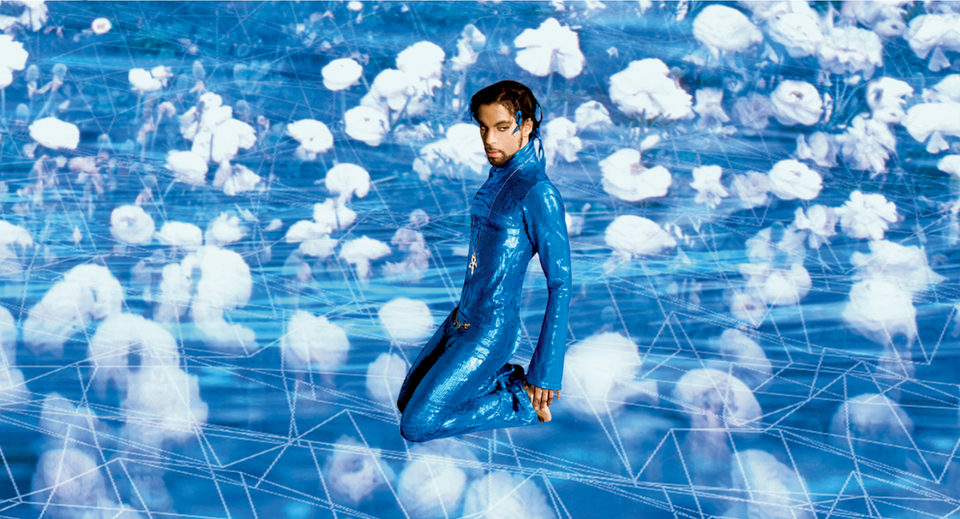
I’d wanted to speak with writer and fashion historian Casci Ritchie about Prince long before I knew that she was writing a book about Prince. (Her name may or may not have been on an actual list on my computer.) Ritchie is a long-time internet friend who’s brilliantly merged her academic background—she has three fashion-related degrees—with her lifelong fandom of the so-called Purple One. And, as someone just starting to wade into Prince’s life and overwhelmingly prolific career myself, I couldn’t have asked for a better crash course than her first book, On His Royal Badness: The Life and Legacy of Prince’s Fashion, which is out this week from 404 Ink.
Dividing the late star’s professional life into 10 chapters, Ritchie frames each one around the particular items of clothing and/or sartorial moments that defined it. While some of these looks will be familiar to most people—his iconic Purple Rain (1984) costumes, perhaps, or maybe his infamous ass-less number at the 1991 MTV Video Music Awards—the actual stories behind them will likely be new even to many die-hard fans. Ritchie turns each look into a character in its own right, always contextualizing it with the relevant biography and fashion history. (I simply cannot stop telling people this week that Prince was noticeably affected by The Matrix [1999] upon its release, on both an emotional and sartorial level.) She called me last week from Glasgow to chat about her fandom origin story, her process of writing the book, Prince’s impact on the greater fashion world as much as the music world, and a whole lot more. Our conversation has been lightly edited for length and clarity.
You obviously write a bit about this in the book, but maybe you could start by telling me a little about your relationship to Prince.
It sounds a bit cheesy but Prince has always been a kind of constant within my life because my parents are big Prince fans, my mum more so than my dad. But when I was growing up, I distinctly remember Prince being played in the car on the way to pick my mum up from work, and seeing his cassette tapes about. I always remember The Hits/The B-Sides (1993), the one where he’s got this Herb Ritts image, and it’s kind of side profile, and he’s got this wonderful Little Richard ‘do. So I always remember those images around in my house.
I knew that there was something really sexual about him, but I didn’t quite understand. I remember, I didn’t actually write about this in the book—I don’t know why—but I was in my dad’s car, and we were driving to pick my mum up, and I was singing along to the song “Peach.” And the lyrics are, “When her titties bounce,” and I was sitting in the car singing along with it, and I remember my dad laughing and laughing. But not saying, “Don’t sing that,” he was just laughing about it. [Laughs] I’m 33, so when I was growing up and watching MTV, it was all the kind of Diamonds and Pearls (1991) stuff and Love Symbol Album (1992) that was playing mostly. So I used to look at [Prince collaborator] Rosie Gaines and think that my mum reminded me of her because she had really big boobs. My mum is like a white, ginger-haired woman from Scotland. [Laughs]
[Laughs] Right.
He was just always there. And then when I was 13 or 14, a friend of mine had messaged me, and he was like, “That Prince guy you like is on Channel 4 just now,” and it was like one o’clock in the morning, and it was Purple Rain. And my mum had never told me about Purple Rain, and it was “Darling Nikki” and “Computer Blue” and he’s dripping in sweat and humping the floor, and I was like, Oh my God. And I was instantly intrigued because, like I said, he’d been around, but it wasn’t until… you know, when you’re coming of age yourself, and you’re placing yourself within his songs.
And at that time as well, I was beginning to start to get really interested in fashion and I was watching old films, so I was looking at people like Prince and people like Lauren Bacall and actually realizing that you didn’t have to look like somebody from Tammy Girl, which [was] a British teen store. I always felt a bit awkward, and then when I saw people like Lauren Bacall and Prince gussied up in heels, and that tailoring and that kind of rigidity in the tailoring body and sculpting of your body, I was like, Oh, this is interesting. And then I just kind of got more and more obsessed. I’m one of those people that gets obsessed with a lot of things, you’re probably the same. So that’s a long and meandering answer.
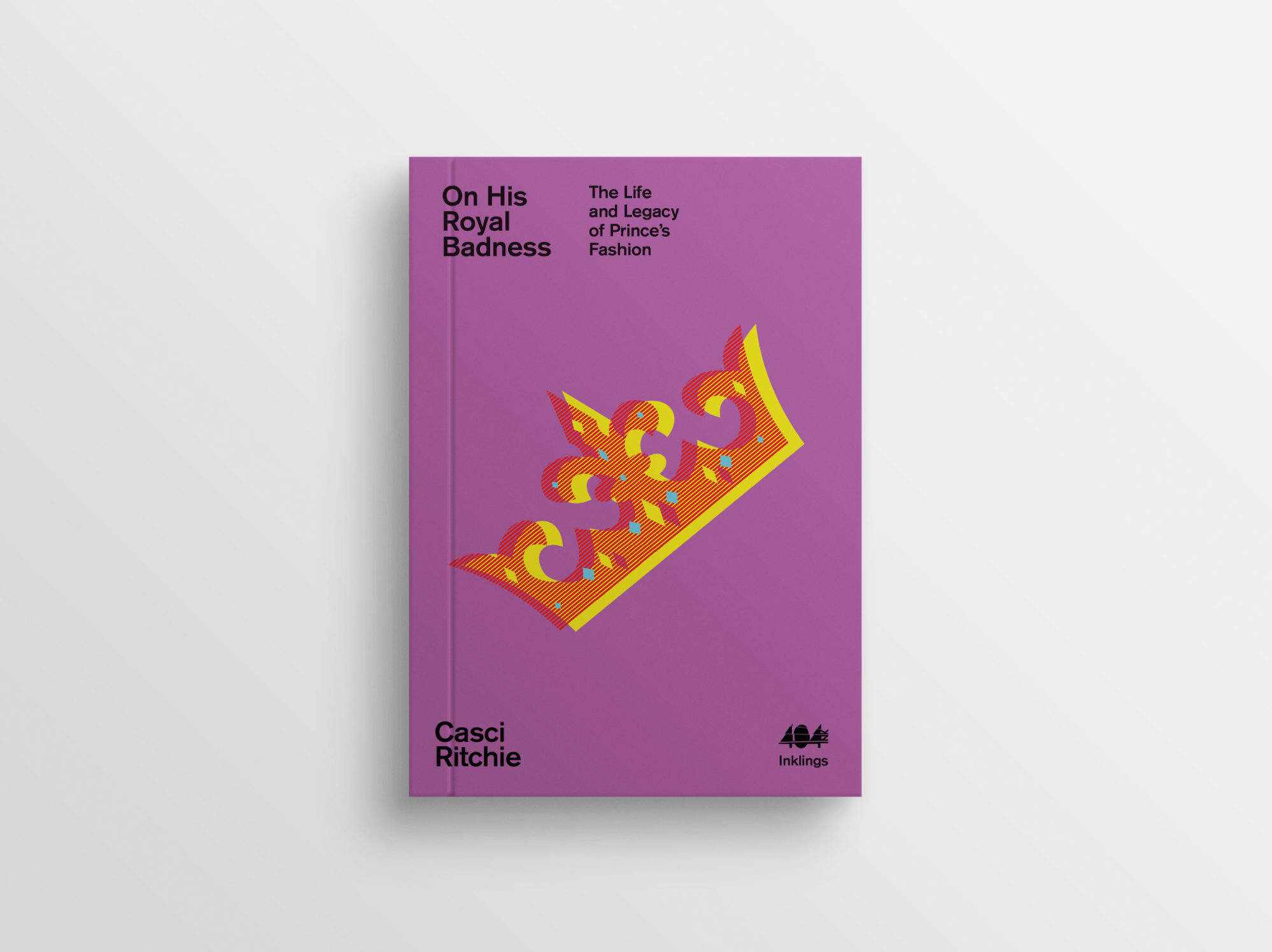
No, I love it. It’s amazing how for so many kids of the ‘80s and ‘90s, Purple Rain was this formative coming-of-age moment. I wrote something earlier in the year about Sofia Coppola, and she’s another one of those kids that was just blown away by Purple Rain, and that played a role in Marie Antoinette (2006). Did you think of yourself as having a mission statement of some kind with this project?
I’d been writing about Prince and researching his fashion seriously after my day job for maybe four of five years. And the opportunity came up to pitch to the publisher a short book about a passion of [mine], and I was like, Well, brilliant. And I basically just wanted it to be an entry-level book for people, where it doesn’t matter if you’re an obsessed Prince fan or you just know Purple Rain or you know nothing about Prince—an entry-level book celebrating Prince’s fashion, highlighting the cultural impact of it, some of the inspirations behind it. I wanted to give kudos to the people that created these looks as well, because so often, when you research performers, you get a lot of cultural pieces on, like, Madonna’s conical bra or blah blah blah, but you don’t get a full [account of their wardrobe]. I’m not there yet with the project, it was only 20,000 words. But I really wanted to tell the story of the Paisley Park wardrobe department. This was like a little taster of what I hope to do. I’m going to start [another] project in a couple months’ time.
I basically just wanted to get people thinking about Prince and fashion, and taking it a bit more seriously, and giving it the recognition it deserves. A lot of people do just write it off as this ostentatious vanity project that he had throughout his career, but it’s so prolific, and his impact on men’s tailoring in particular is really, really important. His unconventional approach to gendered clothing as well, especially as… he was heterosexual at the end of the day, he didn’t claim to be [queer]. So it wasn’t an expression of his own queerness or anything, [though] his impact within the community is undeniable. As Janelle Monáe says, they’re a “free-ass motherfucker,” that’s what I think of Prince. He didn’t give two hoots if he was wearing his lover’s blouse or heels, or borrowing her eyeliner or whatever. He cared about how good it looked on him, and it was that kind of building up of his own stage persona. But it wasn’t just an onstage thing, it was off the stage as well.
I’m not in any way likening myself to Prince, but I see the art of dress to be incredibly important. I’ll wear dresses every day, I wear skirts every day, I usually have makeup on, I usually have [my hair done]—not today because I don’t know if you’ve heard about the heat wave in Scotland. [Laughs] And to me, it’s not just about putting your best foot forward when you’re going out to dinner or going out clubbing or whatever, it’s about the way it makes you feel. And I think that really coincided with Prince as well, because you can see that he had these signature details within his wardrobe that were a bit of a comfort to him. You know, things like the Mandarin collar and the bootleg trousers, the soft fabrics towards the end of his life, that he was obviously wearing to still create this image of himself, so to create that iconic Prince silhouette.
I’m imagining you spending a lot of time just staring at photos of him and seeing what you could make of them.
[Laughs] Yeah, pretty much.
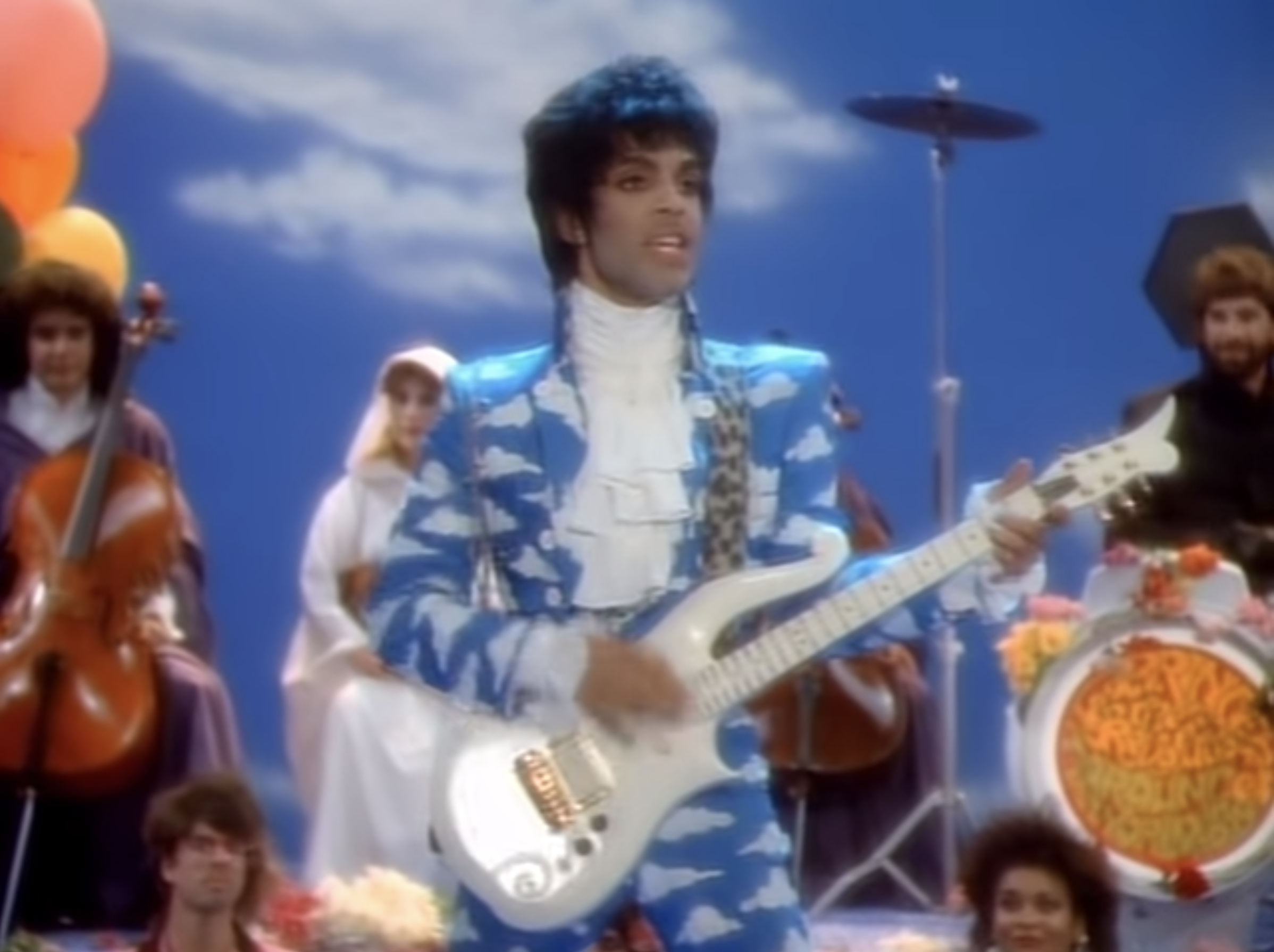
I’m interested in your process in general, but really curious about how you chaptered the book. Did you start with the particular pieces and go from there, or did you pick pieces to match the eras that you knew you wanted to talk about?
I wanted to do a wide berth of his career. I knew that I needed to speak about Purple Rain because if I didn’t speak about it, I think people would be wondering where it was. But I wanted to have a nice blanket across his career, showing different stages that also coincided with important times in his life, like when I talk about the “My Name is Prince” (1992) chain hat and things that were going on with his personal life and his career, with issues with Warner Bros. and things like that. It was quite difficult because I was getting really stuck in the mires with it, because a lot of these are perhaps not my favourite Prince looks—I’ve got other ones that I would love to write about as well and have written about—but I wanted it to be like a gateway into Prince. And because of image rights… can’t afford them… I also wanted to have pieces of his wardrobe that people could easily identify in their mind, like, I know what she’s talking about there. There’s a couple of things that had to be in there, like the “Raspberry Beret” (1985) suit and the third-eye glasses. I had to cut out a lot of stuff, but it’s a good starting point.
I mean, for sure, I think that’s an understatement because it’s a really useful crash course, as somebody that could know more way about him than I do. Do you have an all-time fave Prince look?
The “Violet the Organ Grinder” (1991) music video, to me, is literally… I found it quite difficult to write about that because… do you ever get that, when something just blows your mind so much and makes you feel so much elation and raw energy, that you just don’t know how to put it down on paper? Watching Prince flex his petit arse in this amazing, tailored purple suit—it’s just so impeccably tailored—and his hair is just incredible.
I do really like Prince in the late ‘70s because it’s Prince when he’s unpolished, and you can tell that he’s wearing thrift store clothes, and things don’t fit properly, and things are ripped at the seams, and you re-wear stuff. Like the leg warmers, for example, are probably one of my favourite items that he’s worn because you can see a direct lineage from him wearing those leg warmers… Was it because he did dance when he was younger? Was it because it was cold in Minnesota? Were they in fashion? But then you can see them morphing into this salacious statement. Is it women’s hold-ups you guys call them? Stockings?
Yeah, either.
You can see the direct correlation between that and his thinking process when he gets to Dirty Mind (1980) and he wants to be this kind of rebel, punk provocateur, and he wants to really get up people’s backs. And then from there you can see that morph into the ruched trousers that he wears pretty much throughout the entire 1980s. So I think the leg warmers are probably [a favourite], which is bizarre because there are more beautiful things to look at, but I think the leg warmers tell a really interesting story, and it’s maybe not something that people are widely aware of… Prince looking a bit dirty and rough around the edges.
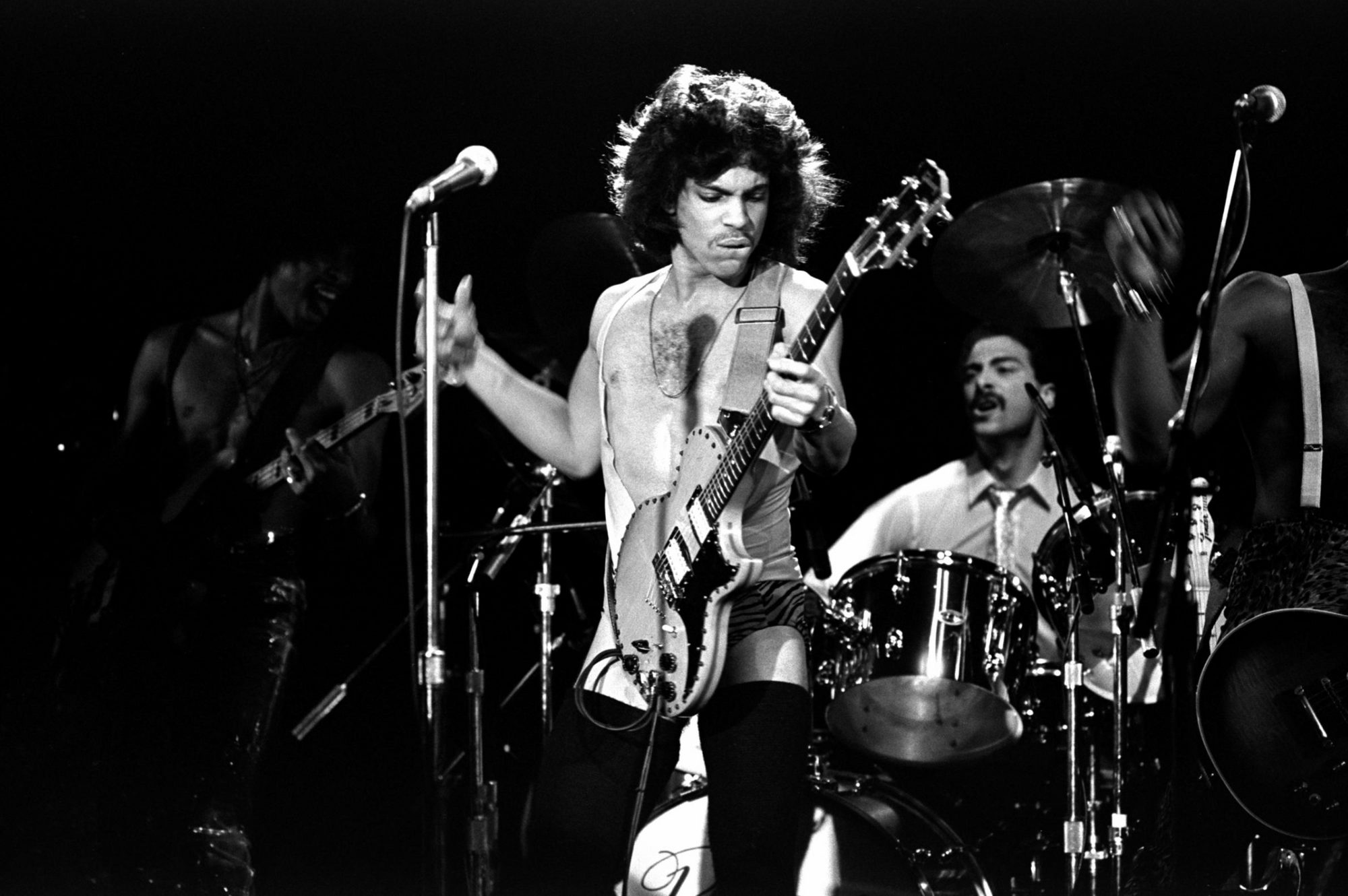
Right. I’ve been describing your book to people as the story of Prince as told through his clothes.
That’s a really lovely way to put it. I couldn’t go fully into his upbringing in Minneapolis. I do believe it’s really, really important to give kudos to his community and the people that raised him and supported him and made Prince who he was. Minneapolis made Prince as much as Prince made Minneapolis. So I do touch upon that, but I wanted to cover a kind of sweeping… bullet points throughout his career. Because dress is so indicative of where we are in life and who we are at that point. And with Prince, it really rang true. With every project, there was a specific colour palette, there was a specific fabric, there was a specific emblem... cuffs, heels… as well as a regimented personal grooming routine and hairstyles. Everything was thought of.
Before I started to do this, there weren’t many people talking about Prince visually in terms of his clothing in that kind of academic way. I wouldn’t say that this book is academic, but there needs to be that. Prince Studies is a new kind of scholarship that really kicked off with a couple of conferences in the UK and the US that I was part of. And I think people were really happy to see people actually talking about Prince’s fashion.
Kirsty Fairclough is someone whose work I’ve read in the past, just on music videos in general. You two are probably acquainted.
She’s incredible, she did the first Prince conference called Purple Reign. I messaged her [when] I had just graduated. I’d never done an academic conference before. And obviously, when I saw that it was a Prince conference, I was like, Holy… fuck. And I messaged her and was really awkward and was like, “Hey, I have no money, I’ve never done this before, can I do this?” She’s so supportive. And from there, there’s been the book and several conferences.
I love the way that you, Casci, pop up in your book, like when you’re talking about a couple of the different fandom-related pilgrimages that you’ve made. And I think there’s a tendency with a lot of academics—I mean, it’s not an academic book, but you are an academic—to sort of omit or downplay personal connections to subject matter, even though it’s what brings them to their research in the first place.
Yeah, I really wanted to insert myself. But I did find it hard because I’ve been so used to writing academically. The past couple of years, the things that I’ve been doing with Prince have been academic journals and book chapters, so I’m so used to theory and all that good stuff. And when I wrote this, I really wanted to put myself in it because people know me as that person obsessed with Prince. Prince means so much to me. I know that sounds so trite, but I made so many good friends because of Prince, and have been part of this Prince scholarship that just continues to grow and grow. And I wanted to put myself in there because if I didn’t, it would just be a book. If I’ve got the opportunity to write a Prince book, I’m gonna write about how obsessed I am.
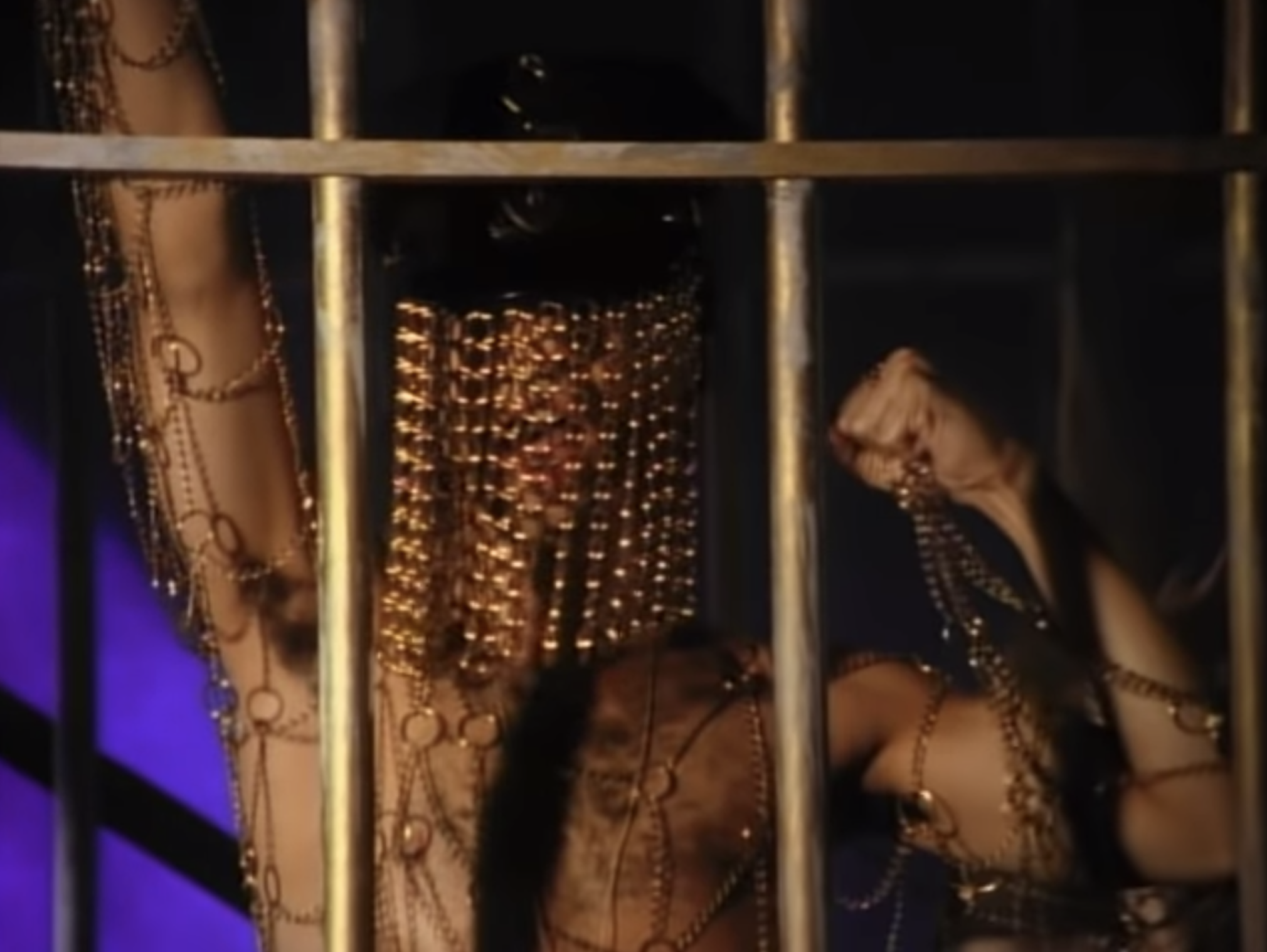
It doesn’t sound trite, I relate to it a lot. This newsletter is very friendly to things like referencing and paying homage in pop music, and it feels like Prince is all over younger artists—how they dress, but also how they sound and even behave. The chain hat was making me think about Orville Peck, whose whole visual thing is like a yee-haw take on the chain hat. Or how like, Beyoncé has modelled her whole hermit-like existence after him, which she sort of admitted while writing the foreword to that book—I think it was a book of photographs—a couple years back. Are there any artists who you think are particularly indebted to him? Where do you see his influence the most these days, sartorially or otherwise?
The obvious one is Janelle Monáe because they’ve done so many literal homages to him, like the “Make Me Feel” (2018) music video. I remember when that came out, I actually cried because it was the best tribute to Prince I’d seen. And it was her music, but it was so perfect. All the other things that I’d seen, like the Madonna one… there’ve been some good ones, but to me, [Janelle] just completely encapsulated Prince, and Prince was her mentor, so they had all these lovely nods to him, and he also helped with that album and that song.
I think Janelle Monáe, the way that she has Wondaland, to me is basically her picking up where Prince left off with Paisley Park. And all the stuff she’s doing now, she’s making this massive universe, which is just so Prince-like. Throughout his career, there was Paisley Park, obviously, but there was Glam Slam nightclub in Japan, and Camden in London, and then there was 3121 nightclub, and all these internet clubs and things like that. And to me, Janelle [embodies him] sartorially but also really embodies his creative freedom. Prince wasn’t just a musician, he was so much more.
But it’s interesting that you say Orville Peck as well because I was just thinking that, I was speaking to my friend about Orville Peck and it’s completely the chain hat. And there are the chaps and things like that—obviously, that’s a different thing—but there’s definitely… Tyler, the Creator as well… Beyoncé has taken so much from Prince, but also Vanity. Who else? Lil Nas X, Frank Ocean. But I think Janelle’s approach to creativity and approach to creating a community is really reminiscent of Prince. I love Janelle, I’ve always loved their music. She does so much for her community as well. It just rings so true of how Prince lived his life, and it’s really beautiful and inspiring to see that that’s still [happening] some place in the world.
He was obviously known for being a very particular person with particular tastes; if he had an opinion, you were gonna hear about it. So it’s so fascinating, these artists that had his stamp of approval, like Janelle, and Lizzo, and Beyoncé. I think it adds a really interesting layer to them. Reading this book gave me a newfound appreciation for him, but also for a lot of the artists that he mentored actively, or that have really borrowed from him.
There’s a really good documentary called Mr. Nelson on the North Side (2021), all about his upbringing in North Minneapolis. I did a wee review for it on Screen Queens if you want to read it. It literally destroyed me and made me so happy because it was all these formative people in Prince’s life that were musicians in Minneapolis that got Prince to where he was. And they were talking about seeing a young, awkward, shy Prince when he was 13. And they were like, “Yeah, you can come play bass with us, you can jump on the drums.” And he would go to nightclubs and perform with them, and they basically took him under his wing.
And that’s what Prince did to other young performers. He obviously favoured certain performers, like if they were young and beautiful it helped. [Laughs] But he really championed young female musicians, and I think the people that came before him were so important, people like Sonny Thompson in Minneapolis. He was one of his mentors at the Way, which was a community centre. He was in Prince’s band, and Prince afforded him all these opportunities and really respected him. And his connections with Sly and the Family Stone, and Santana, and James Brown. He respected what came before him and was like a sponge, and then he imparted it onto the future.
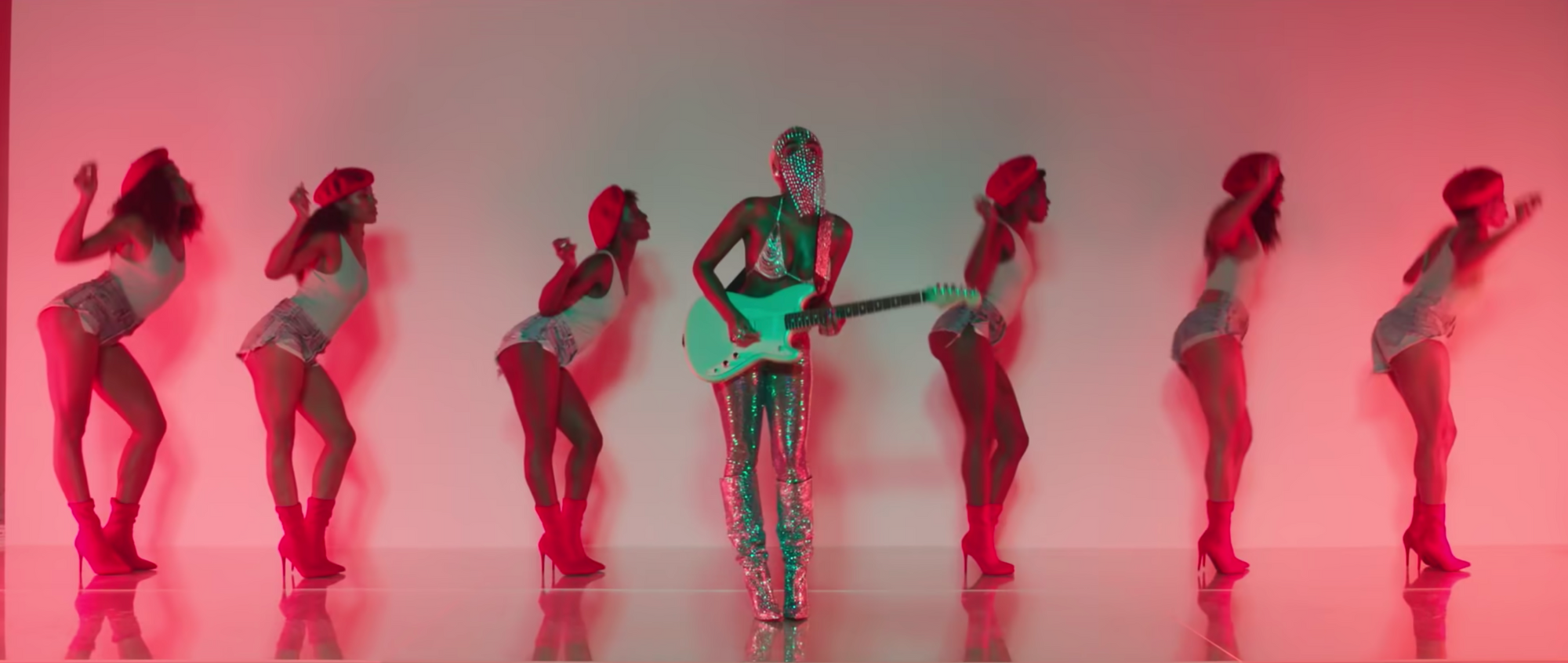
Your book is definitely the kind of read where you want to have YouTube and Google Images on standby, and not in a bad way, but I actually had to cut myself off a few times because I was just going to keep watching the next recommended video into oblivion. It’s obviously not a novel observation or anything, but the man was just endlessly watchable.
That’s what I love about being a Prince fan. I don’t know every single song; I’m not a person that can tell you every bootleg that he’s ever done, or the 18 different versions of a B-side or something. But what I love about being a Prince fan is that you have a plethora of content to soak yourself in. For example, the Welcome 2 America album [released yesterday], it was canned when he was alive and now it’s coming back out. There’s so much. Prince did so many little videos, little movies and long-form music videos that were absolutely wild.
When Prince passed, I think I just listened to him for two years solidly or something because I rediscovered so many different albums and so many of his protégés and his bands that I hadn’t given as much attention to. Like, I loved the Time and I loved Vanity 6, but I hadn’t given that much attention to things like Madhouse and the Family and all these other affiliated artists, like Jesse Johnson. I just completely immersed myself. I don’t see how I won’t be able to do that for the rest of my life because was so prolific… to his detriment as well, he just couldn’t stop producing. And some things were hits, some things were duds. But that’s what creativity is; you don’t hit it out of the park all the time. I love when you see Prince and it’s kind of sketch-y, like when he’s working things out and you can see the cogs turning, because that to me is really interesting. He didn’t give that much of himself away, so when you see it in his music and the art that he created, it’s a nice little insight into the Purple One.
And of course, because of him not having a will and the way that his estate is managed, the material just doesn’t stop coming, which I guess as a researcher is pretty wonderful. Is there a project of his that’s not necessarily a household name but that you’re always begging people to seek out?
There’s a copy of it in the vault, you can see about 20 or 30 minutes of it, but there’s an Apollonia 6 movie that I really want to come out, because it’s the most ‘80s thing you’ve ever [seen]… camisoles and garter belts galore. Visually, it’s incredible, and it’s an album that I love, and a precursor to things like [Beyoncé's] Lemonade (2016) and stuff like that.
Of course.
You can see it on YouTube, it’s very Prince. There’s also a film that Prince did called The Second Coming, just before Purple Rain, that you can see a couple minutes of. It’s quite well-known but [Prince’s directorial debut] Under the Cherry Moon (1986), a lot of people haven’t seen that. I had the opportunity to screen that before all this madness and it was sold out. Everybody walked away from that film howling with laughter and dancing. It’s absolutely absurd and it’s incredible and beautiful, and to me it’s the best Prince film. To be honest, immerse yourself in all. Some of it is ridiculous and that’s also equally fun. I also highly recommend Come (1994), for anyone who needs a writing soundtrack.
Your book really made me want to watch Under the Cherry Moon, so I definitely will be seeking it out. You mentioned Lauren Bacall… aside from Prince, who are some of the other people or things on your figurative or literal moodboard?
So many, I’m one of those people that’s obsessed. John Waters, who said, “Without obsession, life is nothing.” I love John Waters. I love Pee-wee Herman, I love Carmen Miranda. Bette Davis… and the ‘60s and the ‘70s Bette Davis… and the ‘80s. [Laughs] Older Bette Davis is like the ultimate of womanhood, I completely and utterly love Bette Davis. I love Etta James as well… Miss Piggy. I just love people that are unapologetically over-the-top, glamorous. And I think that’s the thing about Prince: he was so sure of himself that nothing really mattered. It didn’t matter if somebody was ridiculing him walking down the street with heels on, he knew that he looked good. I just love that really strong sense of self, and you see that in people like Bette Davis and Lauren Bacall, these matriarchs of Old Hollywood. ●
Mononym Mythology is a newsletter about mostly pop divas and their (visual) antics. It’s totally free, but if you got something out of this instalment, consider buying me a coffee. The best way to support my work otherwise is by sharing it. You can subscribe here, and you can find me on Twitter and Instagram.
